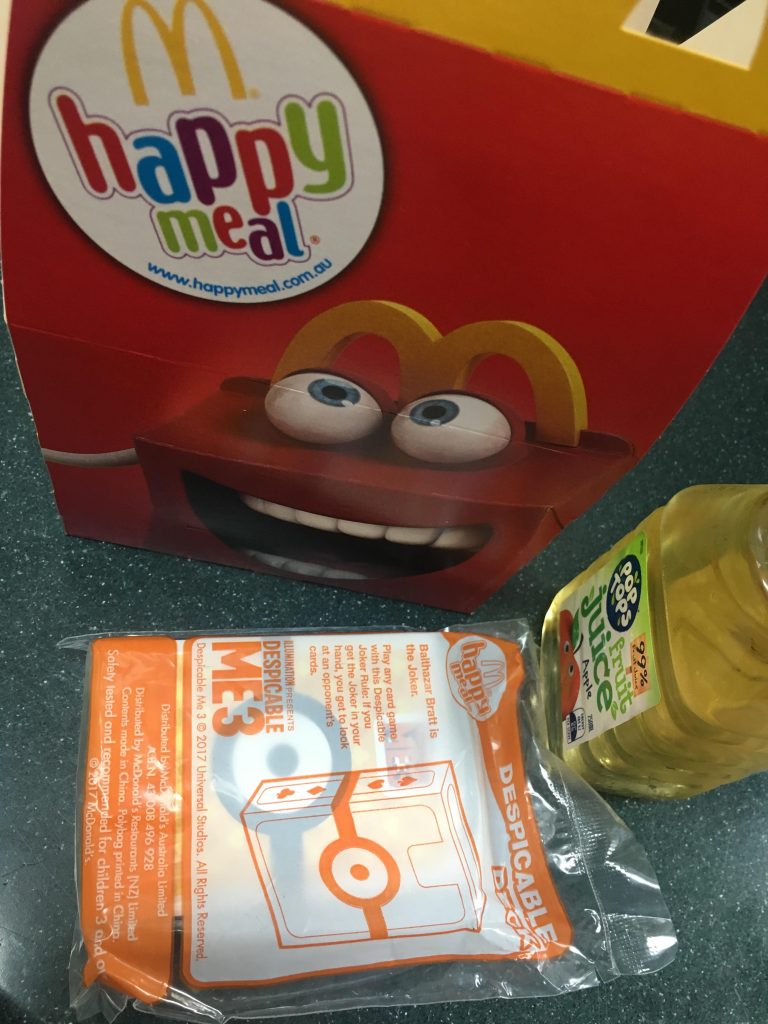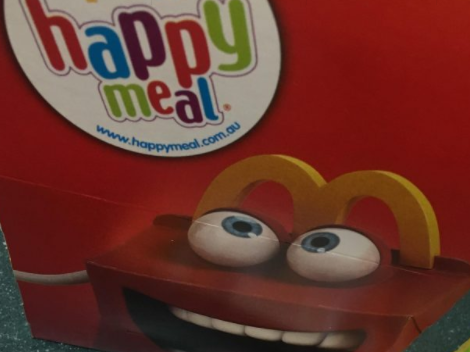Cancer Council Victoria has revealed free toy giveaways with unhealthy foods has a huge influence on kids’ choice of meal.
A recent study involving 904 children aged between five to nine years in Melbourne shows 76 per cent of children chose an unhealthy meal over a healthier meal.
Cancer Council Victoria’s Senior Research Fellow, Dr Helen Dixon who also conducted the research said majority of children tend to choose unhealthier meal option rather than healthier one because of kids’ “innate preference to energy-dense and low-nutrient foods.”
Pairing movie tie-in premiums (MTIPs) with a meal seems to have a powerful and influential impact on kids’ choices of meal.

Movie tie-in premiums included in kids’ meal (Photo by: Yasmin Khushairi)
The study found 32 per cent of children chose a healthier meal paired with MTIPs as opposed to 80 per cent choosing unhealthier meal with MTIPs.
“Any type of meal if paired with a toy, kids would most likely pick that meal,” says Dr Dixon.
“Movie tie-in premiums have an effect and if they are banned on unhealthier foods and just restricted to healthier foods, it would encourage kids to pick the latter option.”
Some places in the US such as San Francisco and Santa Clara County in California have banned free toy giveaways with meals unless nutritional criteria were met.
World Health Organisation (WHO) started raising concerns about these food companies’ marketing strategies targeted to kids impacting on kids’ diet and health.
Experts including Australia’s Preventative Health Taskforce and other public health groups are calling for a stop in this kind of marketing to children and agree that this restriction would improve children’s diets and reduce rates of obesity, overweight and chronic disease.
In United Kingdom, parents realised the power of free toys as a “technique most likely to encourage children to pester their parents for unhealthy food.”
A parent of a 3 year-old, Mr Nizar has no doubt on the matter and says “it’s like when you go to a store and you get free lipstick, of course you would want to buy it.”
“It’s the same with children. They love toys.”
According to Obesity Policy Coalition Executive Manager, Jane Martin, 27 per cent of children in Australia are overweight or obese and up to 40 per cent of children has died from this health issue.
“The problem is if someone is overweight or obese as a child, they are more likely to take that weight into adulthood and it will become very hard to lose that weight and stay at a healthy weight,” says Ms Martin.
However, Dr Dixon says fast food restaurants are not the only ones guilty of this marketing strategy.
Other products such as breakfast cereals that contain high sugar level sold in the supermarkets are also using this method to increase sales and ensure brand loyalty.
In a national survey by Cancer Council Victoria in 2012 found that 75 per cent of consumers are in favor of restricting displays of unhealthy foods and drinks at supermarket checkouts.
33 per cent of the participants voted for the practice to be stopped immediately.
“Products that are heavily advertised are the products kids should eat the least,” says Dr Dixon.
Ms Martin says parents and communities are very supportive of changes in food marketing to children.
Currently there are efforts to restrict this powerful marketing to children such as self-regulations developed by fast food industry but they are very loose and flawed, according to Ms Martin.
“One of the biggest challenges is the industry pushback of this control in this sort of marketing because they know it is going to affect their sales as it is a powerful and influential strategy.”
“They have spent millions of dollars in this particular marketing strategy to children so they are going to fight any attempt to restrict this ban.”
In Australia, one in four children are overweight or obese.
[infogram id=”1_in_4_children_in_australia_are_overweight_or_obese” prefix=”bID” format=”interactive” title=”Obesity rate of children in Australia”]






